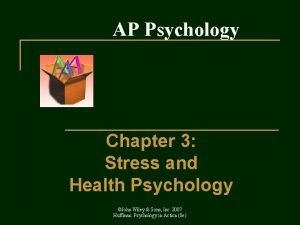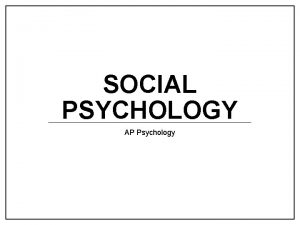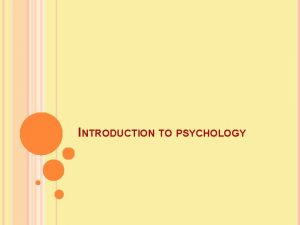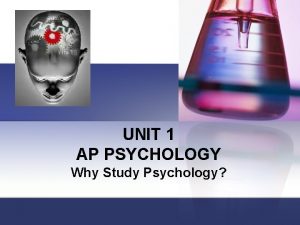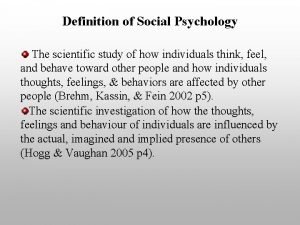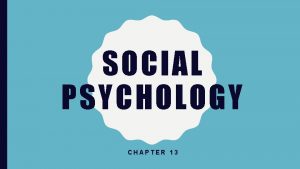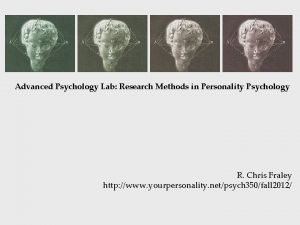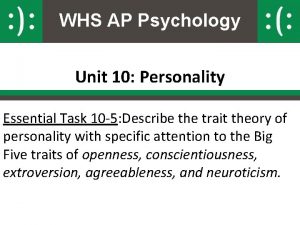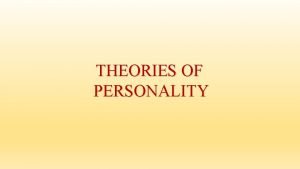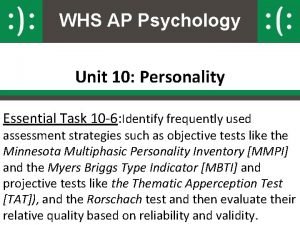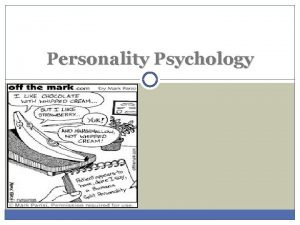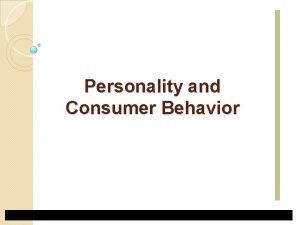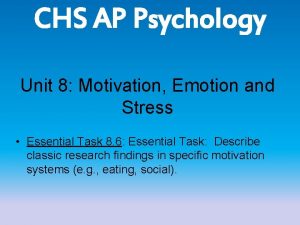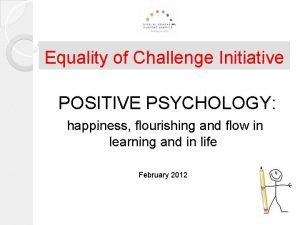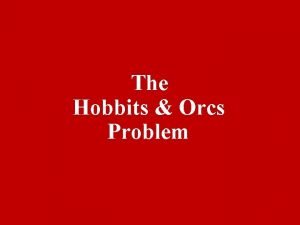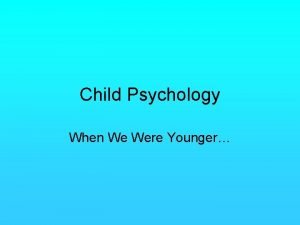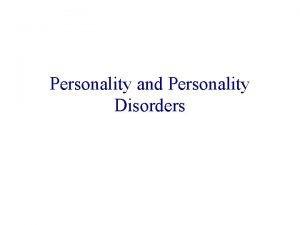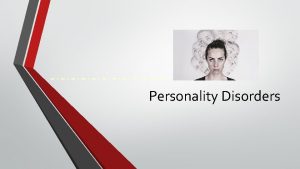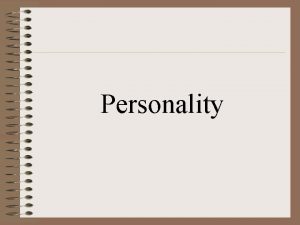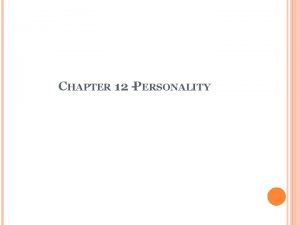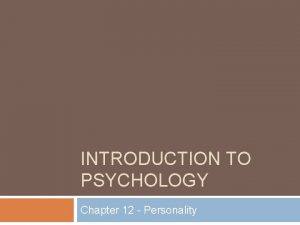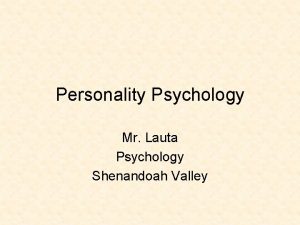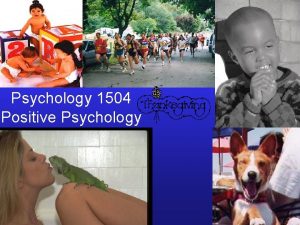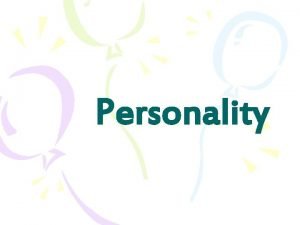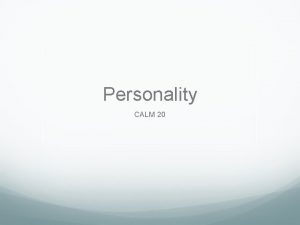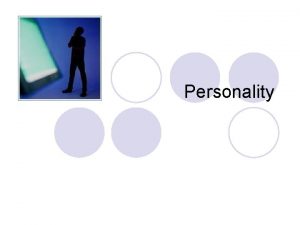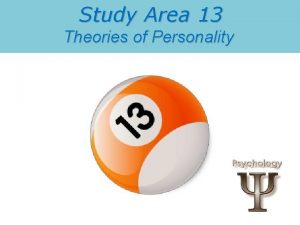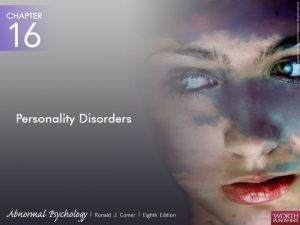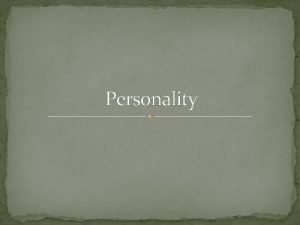Psychology 12 Personality What is Personality Personality an




















- Slides: 20

Psychology 12 Personality

What is Personality? �Personality ◦ an individual’s characteristic pattern of thinking, feeling, and acting ◦ four basic perspectives �Psychoanalytic �Trait �Humanistic �Social-cognitive

The Psychoanalytic Perspective � http: //www. youtube. com/watch? v=wi. By 9 Mm. K 4 j. Y � From Freud’s theory which proposes that childhood sexuality and unconscious motivations influence personality

The Psychoanalytic Perspective �Psychoanalysis ◦ technique of treating psychological disorders by seeking to expose and interpret unconscious tensions ◦ Freud’s psychoanalytic theory of personality sought to explain what he observed during psychoanalysis

The Psychoanalytic Perspective �Free Association ◦ method of exploring the unconscious ◦ person relaxes and says whatever comes to mind, no matter how trivial or embarrassing How do you think getting someone to talk about whatever they want will let us know what is going on in their unconscious?

The Psychoanalytic Perspective �Unconscious ◦ Freud-a reservoir of mostly unacceptable thoughts, wishes, feelings and memories ◦ Contemporary-information processing of which we are unaware �Preconscious ◦ information that is not conscious, but is retrievable into conscious awareness

Levels of Consciousness � Conscious: thoughts or motives that a person is currently aware of or is remembering � Preconscious: thoughts or motives that one can become aware of easily � Unconscious: thoughts or motives that lie beyond a person's normal awareness but that can be made available through psychoanalysis.

Personality Structure �Id ◦ a reservoir of unconscious psychic energy ◦ strives to satisfy basic sexual and aggressive drives ◦ operates on the pleasure principle, demanding immediate gratification


Personality Structure �Superego ◦ the part of personality that presents internalized ideals ◦ provides standards for judgement and for future aspirations

Personality Structure �Ego ◦ the largely conscious, “executive” part of personality ◦ mediates among the demands of the id, superego and ego ◦ operates on the reality principle, satisfying the id’s desires in ways that will realistically bring pleasure rather than pain

Personality Structure Ego Conscious mind Unconscious mind Superego Id �Freud’s idea of the mind’s structure

Personality Development � Psychosexual Stages ◦ the childhood stages of development during which the pleasure-seeking energies focus on distinct erogenous zones � Oedipus Complex ◦ a boy’s sexual desires toward his mother and feelings of jealousy and hatred for the rival father

Oedipus � � Oedipus was born to King Laius and Queen Jocasta. Laius wished to thwart a prophecy saying that his child would grow up to murder his father and marry his mother. Thus, he lef the child to die on a mountainside. A baby was found and raised by shepherds. Heading to Thebes, Oedipus met an older man in a chariot coming the other way on a narrow road. The two quarreled over who should give way, which resulted in Oedipus killing the stranger and continuing on to Thebes. He found that the king of the city had been recently killed and that the city was at the mercy of the Sphinx. Oedipus answered the monster's riddle correctly, defeating it and winning the throne of the dead king and the hand in marriage of the king's widow, Jocasta. Oedipus and Jocasta had four children. In his search to figure out who killed Laius, Oedipus discovered it was he who had killed the late king his father. Jocasta also soon realized that she had married her own son and Laius's murderer, and she hanged herself. Oedipus seized a pin from her dress and blinded himself with it.

Personality Development Freud’s Psychosexual Stages Stage Focus Oral (0 -18 months) Pleasure centers on the mouth-sucking, biting, chewing Anal (18 -36 months) Pleasure focuses on bowel and bladder elimination; coping with demands for control Pleasure zone is the genitals; coping with incestuous sexual feelings Phallic (3 -6 years) Latency (6 to puberty) Dormant sexual feelings Genital (puberty on) Maturation of sexual interests

Defense Mechanisms �Defense Mechanisms ◦ the ego’s protective methods of reducing anxiety by unconsciously distorting reality �Repression ◦ the basic defense mechanism that banishes anxiety-arousing thoughts, feelings, and memories from consciousness Do you believe that repressed memories are real? Can you really forget horrible things?

Defense Mechanisms �Regression ◦ defense mechanism in which an individual retreats, when faced with anxiety, to a more infantile psychosexual stage where some psychic energy remains fixated What are you like when you are angry, do you regress?

Defense Mechanisms �Reaction Formation ◦ defense mechanism by which the ego unconsciously switches unacceptable impulses into their opposites ◦ people may express feelings that are the opposite of their anxietyarousing unconscious feelings How might someone who cannot deal with their homosexual urges react?

Defense Mechanisms � Projection ◦ defense mechanism by which people disguise their own threatening impulses by attributing them to others � Rationalization ◦ defense mechanism that offers self-justifying explanations in place of the real, more threatening, unconscious reasons for one’s actions How might someone who is angry project onto someone else?

Defense Mechanisms �Displacement ◦ defense mechanism that shifts sexual or aggressive impulses toward a more acceptable or less threatening object or person ◦ as when redirecting anger toward a safer outlet Do you ever punch you pillow?
 Health psychology definition ap psychology
Health psychology definition ap psychology Social psychology ap psychology
Social psychology ap psychology Nature and scope of psychology
Nature and scope of psychology Positive psychology ap psychology definition
Positive psychology ap psychology definition Social psychology is the scientific study of:
Social psychology is the scientific study of: Psychology experiment
Psychology experiment Define personality psychology
Define personality psychology Definition of personality
Definition of personality Unit 10 personality ap psychology
Unit 10 personality ap psychology Dynamic personality definition
Dynamic personality definition Evocation personality psychology
Evocation personality psychology Allport personality theory
Allport personality theory Unit 10 personality ap psychology test
Unit 10 personality ap psychology test Nature of personality in psychology
Nature of personality in psychology Antisocial personality disorder ap psychology definition
Antisocial personality disorder ap psychology definition Horney's cad theory of personality
Horney's cad theory of personality Picture arrangement test examples
Picture arrangement test examples Unit 8 motivation and emotion
Unit 8 motivation and emotion Signature strengths
Signature strengths 3 hobbits
3 hobbits Kohlberg psychology
Kohlberg psychology
